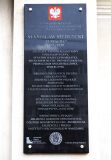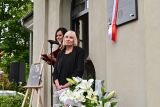back...85. anniversary of the death of Stanisław Siedlecki, senator of the Second Republic of Poland

On 17 September 1939, facing the Soviet aggression, Stanisław Siedlecki (1877-1939) committed suicide in Krzemieniec (now Ukraine). He was an independence and socialist activist, senator of the Second Polish Republic, precursor of the Promethean movement, promoter of co-operative activity and community worker, as well as chemical engineer.
The senator's family – his wife Felicja and daughters Maria and Irena – were arrested by the NKVD in June 1940 and deported to a labour camp in Siberia. Under an amnesty in 1941, they made their way to Uzbekistan, where the6th Infantry Division of the Anders Army was being formed. Due to her poor health, Felicja Siedlecka was placed in a Polish field hospital. In 1942, the Siedlecki family was evacuated to Iran, then to India. The senator's wife died in 1944 in Bombay. The daughters emigrated to Australia six years later.
17 September 1939 was particularly memorable for the senator's daughter Irena Wołyniak née Siedlecka:
"I've been fever-free for a few days now, but I haven't fully recovered. I clearly remember the late morning or early afternoon of 17 September 1939 as I was sitting outside the barn, relaxing and enjoying a lazy rest. Suddenly I saw my father's face in front of me. He was clearly moved and agitated. He looked at me with eyes full of love and gentle emotion, but also full of fear. I have never seen my father scared before. He was usually very calm and spoke about the war in a matter-of-fact and reassuring way. I joyfully lifted my face to his face and called out "Dad!". Then, when I lowered my gaze to look closely at him and embrace him, his face disappeared. No one was with me, but the impression of that moment will stay with me forever. The father gave his daughters immeasurable love, I could see it in his eyes, but fear? I understood everything when I heard a conversation between my sister and my cousin. Someone broke the news to them that Dad had shot himself to avoid being arrested by Soviet soldiers. I realised that with the eyes of my soul I saw him at the moment of his death.”
On the 14th of June this year, on the initiative of the Museum of Polish Children – Victims of Totalitarianism, a commemorative plaque was unveiled dedicated to Stanisław Siedlecki, senator of the Second Republic, one of the most prominent representatives of the Promethean movement. The event took place at 14 Chłopickiego Street in Warsaw, in the house where the Siedlecki family had lived before the war. The ceremony was attended by Dr Krystyna Haq, the senator’s granddaughter. On this occasion, a speech was given by Dr Ireneusz Piotr Maj, the Museum’s director. It reads:
“Stanislaw Siedlecki devoted his entire life to service in the love of Poland. As the Fatherland-Mother was dying before his eyes, his heart broke.He dedicated his life to serving his Family; when he was no longer able to keep them safe, when he realised that he would be a burden to them, he left.
The story of the Siedlecki family reflects the tragic fate so typical of many Polish families stigmatised by the Second World War. The fight against the invaders, the death of loved ones, arrests, deportations, the Gehenna of Siberia, hunger, the suffering of children - war orphans, the fate of wandering and the longing for Poland. We are adding another chapter to this story today. Today, there are relatives of the Siedlecki family among us, and above all the Senator's granddaughter, Mrs Krystyna Haq, who came to Poland from distant Australia, where her Polish parents settled after the war.”




